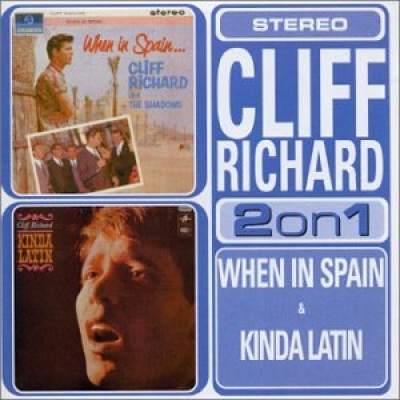
When in Spain
by Dave Thompson Through the first half of the 1960s, Cliff Richard was recording at a furious rate, turning out material not only for a seemingly endless stream of new U.K. singles, EPs, albums, and soundtracks, but also for the foreign markets where his appeal was strongest. What makes this last category especially appealing is that he actually sang in the language in question -- Germany, Spain, France, and Italy were all granted a number of exclusive recordings, with the first-named earning the equivalent of six full albums worth of material between 1960-74. This vast corpus has since been compiled onto the Bear Family box set On the Continent; less well-documented is the fact that a number of these recordings were also made available in the U.K. History, after all, insists that prior to the Beatles' Sergeant Pepper, artist's albums were essentially little more than random collections of songs. But Richard and producer Norrie Paramor had been scheming thematic -- i.e. conceptual -- albums since 1963, beginning with When in Spain. Recorded in Barcelona, When in Spain became Richard's seventh album (soundtracks and compilations notwithstanding) in late 1963, at a time when Merseybeat was ensuring that his domination of the U.K. pop charts was undergoing its most serious challenge yet. The fact that he did not rise to the challenge, however, only amplifies his untouchability. As far back as his second album, 1959's Cliff Sings, he had stated his intentions to rise above simple rock & roll; by the time of this album, he was ready to transcend pop altogether. Overlook the fact that the track listing is very much a beginner's guide to the genre, the kind of thing which turns up on TV-advertised Latin Lovers Greatest Hits-type albums, and it is a beautiful album. "Perfidia," with the Shadows in full flight behind him, an insistently percussive "Frenesi," and the flirtatious "Maria No Mas," all draw out some of his most majestic vocals, while the moments where he slips -- a gently drifting, and clearly hesitant "Vaya Con Dios" -- themselves possess a convincing fragility which only amplifies the album's overall appeal. The same can be said for Richard's occasionally suspect pronunciation, and the nagging suspicion that he might not be fully aware of what he's singing about. Several songs from this album would be reprised with English lyrics on the artist's next album, 1965's eponymous set. But it's a mark of When in Spain's naïve strengths that neither "Sway" nor "Kiss," "Magic Is the Moonlight" nor "Perfidia," could ever improve on their Spanish language siblings. Of course, line this album up against the originals of the songs it features and Richard's grand illusion promptly crumbles. He was banking, however, on the fact that nobody would ever need to do that -- and you know what? He was right.

